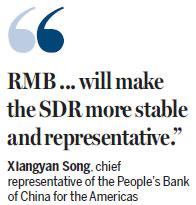Yuan, debt key issues: experts
Increasing international acceptance of the Chinese currency will bolster its prospects for inclusion in a key benchmark, while debt problems and lagging job growth could pose a challenge for China's economy in 2016, speakers said at a financial conference.
From the establishment of the Asian Infrastructure Investment Bank (AIIB) to this summer's stock market turmoil, " never has China become more of a factor in the world economy", said Fan Xing, The Chinese Finance Association's president-elect, at its 21st annual conference at the Marriott Marquis Hotel in New York on Sunday. The topic was titled China and World Economy: New Risks, Uncertainties and Opportunities.
The China keynote address was delivered by Xiangyan Song, chief representative of the People's Bank of China for the Americas. Noting that more than 50 foreign central banks now have China's currency the yuan, or renminbi, in their reserves, Song expects that it will gain admission to the International Monetary Fund's (IMF) Special Drawing Rights (SDR) basket of currencies.
"RMB is the only currency to have met the gateway requirements and will make the SDR more stable and representative," Song said.
China has been waging a campaign to have the yuan included in the IMF basket, which the organization uses to value reserve assets. The basket includes the dollar, the euro, the British pound and the yen. The IMF may decide later this month whether to include the yuan.
Song said the inclusion of the yuan will not affect the dominance of the US dollar in global trade and payments. "The dollar will remain the dominant currency for a long time," he added.

Peter Hopper, chief economist for Deutsche Bank Securities, and Nancy Lazar, partner and head of economic research for Cornerstone Macro, discussed the outlook for the Chinese and US economies in 2016.
Hooper is "moderately bullish on China for next year. Continuing stimulus from the central bank and government spending plus a rebound in property markets are positives for the world's second-largest economy. Challenges include a structural debt problem that is getting worse," said Hopper.
He believes the US economy will expand 2.5 percent next year on higher consumer spending driven by continuing job growth and a pickup in spending from state and local governments. Potential thorns for the US include a stronger dollar that will continue to pressure exports, Hopper said.
He also expects the Federal Reserve to raise interest rates by increasing the federal funds rate next month and predicts " a more aggressive Fed policy as 2016 fades into 2017".
While not forecasting a recession, Lazar said some of the worries from 2015 (falling commodity prices and slow economic recoveries in Europe and Japan) will extend into next year.
"The drop in commodity prices is a major plus for the developed economies like the US and Europe," said Lazar. "Recessions will continue in Brazil and Russia next year."
Lazar said challenges for China include high credit and debt levels. China's headwinds next year are likely to include shrinking corporate profits, which will further add to weakening employment levels.
paulwelitzkin@chinadailyusa.com
(China Daily USA 11/09/2015 page1)


















